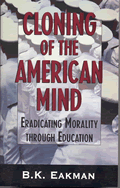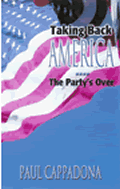Related
Article:
Red
Lake MN.
School Shooter Was on
Psychiatric Drug
Prozac
Other
Eakman
Articles:
So, You Want to be an "Education" Candidate
The Resignation of a Schoolteacher
ON EPIDEMIC-LEVEL MENTAL ILLNESS IN KIDS
By
Beverly Eakman
March 27, 2005
NewsWithViews.com
Christopher Stollar�s Special Report to the Washington Times, �'It�s a hidden epidemic': Diagnoses of bipolar disorder on rise among youngsters� [Wed., March 9, 2005] was itself an epidemic -- an outbreak of articles hyping the supposed increase of various mental illnesses among both children and adults.
These commentaries and reports promote the kinds of pseudo-science that will ensure, one day soon, that all the nation�s schoolchildren (plus their parents and teachers) are screened for mental illnesses under outrageous pieces of legislation like the one U.S. Congressman Ron Paul (R-TX) has worked so hard, and unsuccessfully, to defeat: the New Freedom Initiative (a.k.a. Universal Mental Health Screening Program). If mass psychological screening succeeds, regardless of what euphemism it goes by (�freedom initiative�?), it will morph into a political litmus test that holds a child�s future hostage to whatever viewpoints happen not to be politically or socially correct at that time. Unlike the young man in Stollar�s piece, Alex Raeburn, a child will not have the luxury of changing his mind, maturing, and learning to live with his personality quirks. Once a person is labeled �mentally unbalanced,� they face great difficulty in being taken seriously, ever again.
There are significant hints in Stollar�s article pointing to the ineffectiveness of both psychiatric diagnoses and drugs. One psychiatrist is said to have just dashed off a prescription for Mellaril, �a drug originally used for schizophrenia.� Then the boy was treated for depression. The doctor started him on the antidepressant Zoloft, at which point young Alex became suicidal. At length, the doctor opts for �bipolar disorder.� I call this �shot-in-the-dark medicine.�
Whenever a drug seems to work for psychological ailments, nobody knows why or how, a fact confirmed in Stollar�s article. Experts concede that there is no medical test (blood, x-ray, chemical measurement) for bipolar disorder, depression, schizophrenia, mania or, I might add, for virtually any of the mental �illnesses� listed in the entire Diagnostic and Statistical Manual of Mental Disorders (DSM), the bible of the mental health profession.
So, just what kind of medicine is this? If we were talking about a painkiller like Vioxx, and it turned out people keeled over after taking it, that drug would be pulled from the market faster than you could say �ouch!� If there is no medical test, then by definition, there can be no diagnosis. All you have left are a bunch of quirky personality traits. Larry Barber, the marriage and family therapist quoted in Stollar�s piece, repeats what many dissident psychiatrists, such as Drs. Peter Breggin and David Healy have already stated: that psychiatric drugs mainly �blunt [the] ability to function.� They do not cure anything.
In an article published in the March issue of Chronicles: A Magazine of the American Culture �Has America Lost Her Moral Gag Reflex?�), I wrote about Dr. Franz J. Kallmann, who fled to America in the mid-1930�s, after having served under Ernst R�din, head of Hitler�s �racial hygiene� program. It is appropriate here to revisit this man, who somehow received accolades for his ideas in the New York Times. Even after he arrived on American shores to escape the Third Reich�s henchmen, he warned of rampant mental illness, exclaiming that if something weren�t done soon, schizophrenics would outnumber normal individuals. He went on to argue in favor of mass mental health screening and �psychiatric genetics� (a.k.a. parent licensing),
Stollar�s article is treading on some very thin ice, and so are legislators and educators who buy in to increased mental health canvassing in schools and among parents.
Childhood is extremely difficult for some kids, and parenting is more difficult still. I, too, threatened to kill myself, had disconcerting mood swings, talked fast and would pout for hours or days in silence to get my own way. Fortunately, I had wise parents who bit their lips, literally, and said, �Fine, your tough luck, not ours.� It was the hardest thing they ever did, but guess what? I decided making wild threats was not a good way to get attention. I grew up. My parents always knew what was going on. They were there. They set limits. I matured. And I learned to live with my idiosyncrasies. As everyone must, sooner or later.
Without
our quirks, eccentricities and peculiarities, we no longer are capable
of harnessing the genius of human creativity and that precious commodity
so revered by the politically correct elites, diversity.
� 2005 Beverly Eakman - All Rights Reserved
Order
Beverly's book, Cloning
of the American Mind is out of print, supply is limited
Beverly Eakman is an Educator, 9 years: 1968-1974, 1979-1981. Specialties: English and Literature.
Science Editor, Technical Writer and Editor-in-Chief of official newspaper, National Aeronautics and Space Administration, 1974-1979. Technical piece, "David, the Bubble Baby," picked up by popular press and turned into a movie starring John Travolta.
Chief speech writer, National Council for Better Education, 1984-1986; for the late Chief Justice Warren E. Burger, Commission on the Bicentennial of the US Constitution, 1986-1987; for the Voice of America Director, 1987-1989; and for U.S. Department of Justice, Gerald R. Regier, 1991-1993.
Author: 3 books on education and data-trafficking
since 1991, including the internationally acclaimed Cloning
of the American Mind: Eradicating Morality Through Education. Executive
Director, National Education Consortium. Website: BeverlyE.com
E-Mail: deakman@erols.com
Unlike the young man in Stollar�s piece, Alex Raeburn, a child will not
have the luxury of changing his mind, maturing, and learning to live with
his personality quirks. Once a person is labeled �mentally unbalanced,�
they face great difficulty in being taken seriously, ever again.












